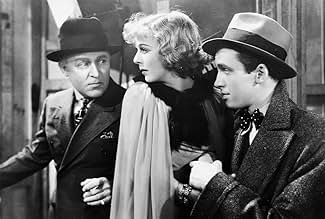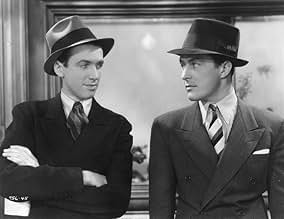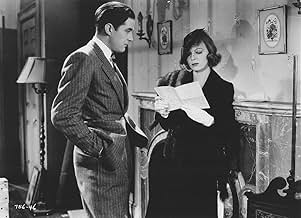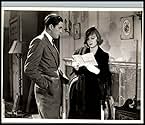अपनी भाषा में प्लॉट जोड़ेंA young married couple's relationship becomes strained when he is assigned overseas as a foreign correspondent and she becomes a major stage star.A young married couple's relationship becomes strained when he is assigned overseas as a foreign correspondent and she becomes a major stage star.A young married couple's relationship becomes strained when he is assigned overseas as a foreign correspondent and she becomes a major stage star.
- पुरस्कार
- कुल 3 जीत
Ray Milland
- Tommy Abbott
- (as Raymond Milland)
Ronnie Cosby
- Kit
- (as Ronald Cosbey)
Arthur Aylesworth
- Secretary
- (बिना क्रेडिट के)
King Baggot
- Character man
- (बिना क्रेडिट के)
Tommy Bond
- Pesky Kid
- (बिना क्रेडिट के)
Harry C. Bradley
- Desk Clerk
- (बिना क्रेडिट के)
Tyler Brooke
- Author
- (बिना क्रेडिट के)
Daisy Bufford
- Maid
- (बिना क्रेडिट के)
Jack Cheatham
- Taxi Driver
- (बिना क्रेडिट के)
Jack Daley
- Conductor
- (बिना क्रेडिट के)
John Dilson
- Stage Manager
- (बिना क्रेडिट के)
Charles Fallon
- Prof. Dindet
- (बिना क्रेडिट के)
फ़ीचर्ड समीक्षाएं
Stewart's first breakout role. The magnetism between Sullavan and Stewart is undeniable in this sophisticated story about a couple whose careers don't quite mesh. Their divergent careers inevitably causes their marriage to be a rocky one with many ups and downs. The plot, although a progressive one ahead of its time, is not an appealing one. I wanted to like this movie, but the plot kept me from it. It fell flat and seemed rushed.
This is a very early Stewart film that really gave him his first big break with a leading role. Sixth billed in "Murder Man" and fifth billed in "Rose Marie", he was barely visible in his first two features at MGM. On loan to Universal, here he was teamed with Margaret Sullivan, and together they play a couple that marries on impulse and then begin pursuing their own individual careers - she is an actress, he is a journalist. Conflict develops when her career takes off and his does not. This film is very typical of those melodramas that were so common in the 1930's, but it is still interesting to see what Stewart does with this early role in his career. Stewart and Sullivan have a better chance to show off their chemistry in 1938's "Shopworn Angel", still it is a good look at a film made right before the Laemmle's lost Universal to creditors. I'd recommend it mainly for the performances.
By the time her fifth film was ready to be launched Margaret Sullavan had achieved a position of some clout with her original studio Universal Pictures. She used that clout to get as her leading man, a young player she knew from Broadway as the best friend of her then husband Henry Fonda. Sullavan got Carl Laemmle to get Louis B. Mayer to loan him James Stewart and from Paramount as the second lead she got Ray Milland.
But Stewart was her project and she more than director Edward Griffith got him through Next Time We Love to favorable notices. This was Stewart's highest billing yet, co-starring to Margaret Sullavan and he made the most of it. They did three more films together and in only one of them did either Sullavan or Stewart not die in. They were the king and queen of bittersweet romances back in the day.
Sullavan is highly successful stage star and Stewart is a reporter with ambitions to be an international correspondent. Sullavan might have been better off marrying Ray Milland who is a producer, but something about the shy and stammering Jimmy wins her heart and that would be the first in a long line of female hearts on the screen to feel that way.
Of course being an international correspondent does keep Stewart away a lot and Margaret does not want to give up a successful stage career that's just getting started. Even with the arrival of a baby boy the problems only increase until a really heavy crisis comes on that overwhelms all.
Next Time We Love is an intelligent mature drama that holds up well and I'm surprised has not been remade. I could see a Cate Blanchett or a Gwyneth Paltrow in Sullavan's role with possibly Matthew McConaughey in the Stewart part in a remake today. Somebody in Hollywood take note.
But Stewart was her project and she more than director Edward Griffith got him through Next Time We Love to favorable notices. This was Stewart's highest billing yet, co-starring to Margaret Sullavan and he made the most of it. They did three more films together and in only one of them did either Sullavan or Stewart not die in. They were the king and queen of bittersweet romances back in the day.
Sullavan is highly successful stage star and Stewart is a reporter with ambitions to be an international correspondent. Sullavan might have been better off marrying Ray Milland who is a producer, but something about the shy and stammering Jimmy wins her heart and that would be the first in a long line of female hearts on the screen to feel that way.
Of course being an international correspondent does keep Stewart away a lot and Margaret does not want to give up a successful stage career that's just getting started. Even with the arrival of a baby boy the problems only increase until a really heavy crisis comes on that overwhelms all.
Next Time We Love is an intelligent mature drama that holds up well and I'm surprised has not been remade. I could see a Cate Blanchett or a Gwyneth Paltrow in Sullavan's role with possibly Matthew McConaughey in the Stewart part in a remake today. Somebody in Hollywood take note.
Sight unseen this movie has a number of factors in its favor: 1) it stars two of the most charismatic performers of Hollywood's Golden Age, James Stewart & Margaret Sullavan, paired for the first time; 2) it features the underrated Ray Milland as Jimmy's best friend, who becomes the third player in their romantic triangle; 3) several of Hollywood's familiar character actors appear in supporting roles (Grant Mitchell, Hattie McDaniel, Christian Rub, etc.), and 4) its story was born in the typewriter of the legendary Preston Sturges, one of the all-time great screenwriters. According to various biographies of Sturges he spent a couple of weeks on the first draft of this drama while simultaneously cranking out a comedy for Carole Lombard called Love Before Breakfast. Sturges' script for Next Time We Love was then handed off to an obscure writer named Melville Baker who revised it, but in the end only Baker received screen credit. It would appear that this project meant little to Sturges, but, bearing in mind the memorable results when Margaret Sullavan took the title role of his brilliant adaptation of The Good Fairy in 1935, I sat down to watch this one hoping it might also be something special.
Unfortunately, and despite a decent opening half-hour or so, this film ultimately disappoints. Stewart and Sullavan have good chemistry and make a believable couple. We follow the course of their relationship with interest as they marry on impulse and Stewart aggressively pursues a career in journalism while Sullavan takes a more casual interest in stage acting, while best friend Milland maintains a steady presence in the background. Stewart & Sullavan have a baby, but trouble soon develops: her career in the theater suddenly takes off just as his progress at the newspaper hits a brick wall. Tension mounts as she becomes the breadwinner after he screws up a major assignment and is fired. They separate, and Sullavan flourishes while Stewart avoids coming home and stays out of the picture. Milland, at this point, finally steps forward and makes his feelings known.
More plot twists come along, but for me the movie starts to fizzle along about the time Sullavan's acting career takes off. Important events occur too abruptly, without the appropriate build-up: all of a sudden, she's a famous and powerful Broadway star. It looks as if some backstage scenes were filmed but then cut, suggested by the fact that Grant Mitchell, who plays a theatrical producer, receives fourth billing in the credits though he appears in only one brief scene. From that point onward Sullavan's stardom seems unreal while the behavior of Stewart's character becomes increasingly melodramatic and unbelievable. In the later scenes none of the main characters behave like recognizable human beings, and despite the best efforts of these estimable actors we no longer buy anything they're saying or doing by the climax. The story raises a provocative issue, i.e. the conflict that results when a wife earns more money than her husband and thus wields more power, but the filmmakers chickened out without really addressing the matter, choosing a sappy "Hollywood" resolution over anything genuinely satisfying.
Next Time We Love is fairly interesting nonetheless, worth seeing if you enjoy Hollywood melodramas of the '30s and certainly if you're a fan of the stars, but in the end it doesn't amount to much. Fans of Preston Sturges will be hard pressed to recognize his contribution, and may prefer to skip this one and enjoy one of his more characteristic works instead.
Unfortunately, and despite a decent opening half-hour or so, this film ultimately disappoints. Stewart and Sullavan have good chemistry and make a believable couple. We follow the course of their relationship with interest as they marry on impulse and Stewart aggressively pursues a career in journalism while Sullavan takes a more casual interest in stage acting, while best friend Milland maintains a steady presence in the background. Stewart & Sullavan have a baby, but trouble soon develops: her career in the theater suddenly takes off just as his progress at the newspaper hits a brick wall. Tension mounts as she becomes the breadwinner after he screws up a major assignment and is fired. They separate, and Sullavan flourishes while Stewart avoids coming home and stays out of the picture. Milland, at this point, finally steps forward and makes his feelings known.
More plot twists come along, but for me the movie starts to fizzle along about the time Sullavan's acting career takes off. Important events occur too abruptly, without the appropriate build-up: all of a sudden, she's a famous and powerful Broadway star. It looks as if some backstage scenes were filmed but then cut, suggested by the fact that Grant Mitchell, who plays a theatrical producer, receives fourth billing in the credits though he appears in only one brief scene. From that point onward Sullavan's stardom seems unreal while the behavior of Stewart's character becomes increasingly melodramatic and unbelievable. In the later scenes none of the main characters behave like recognizable human beings, and despite the best efforts of these estimable actors we no longer buy anything they're saying or doing by the climax. The story raises a provocative issue, i.e. the conflict that results when a wife earns more money than her husband and thus wields more power, but the filmmakers chickened out without really addressing the matter, choosing a sappy "Hollywood" resolution over anything genuinely satisfying.
Next Time We Love is fairly interesting nonetheless, worth seeing if you enjoy Hollywood melodramas of the '30s and certainly if you're a fan of the stars, but in the end it doesn't amount to much. Fans of Preston Sturges will be hard pressed to recognize his contribution, and may prefer to skip this one and enjoy one of his more characteristic works instead.
Among all of Jimmy Stewart's films, "Next Time We Love" is among the more obscure...even though there is some really terrific acting in it as well as three top actors (Margaret Sullavan, Jimmy Stewart and Ray Milland). As far as why it's not a popular film, I have a strong guess....it's not a particularly enjoyable picture and you have a hard time really caring about the characters.
The story itself is a great illustration of the old saying, "Act in haste, repent at leisure". This is because Cicely and Chris (Sullavan and Stewart) meet and decide to get married only a few days later. It's clearly an impulsive move and even before the honeymoon it's clear this will NOT be an easy marriage. Chris is a newspaper correspondent and likes the idea of traveling the world to report the news. This is clearly NOT a career conducive to a great marriage. But to make it worse, Cicely soon takes up acting and she likes it...and it pays well. In fact, when Chris loses a job, she carries them. This SHOULD make them happy but it doesn't. After all, it's the 1930s and a man, a 'real man', was expected to be the bread-winner and a wife was to stay home, make babies and wait for her man to come home from work--which was impossible with being a correspondent and her being an actress. So, years pass and Chris roams the world while Cicely becomes famous...and they barely have any time for each other. Both have created their own separate lives...and all the while, their good friend Tommy (Milland) is there to help Cicely...and soon it becomes apparent Tommy wants to be more than just a friend.
So basically you have two strong-willed people who are more concerned with their careers than each other...something hardly the stuff of a romance or fun film. In many ways, I wonder how much this story was influenced by the Hollywood life...and broken marriages. Either way, the acting is stupendous (particularly by Sullavan)...but the film is still unpleasant and not particularly involving for me. As for me, I just wanted to slap them both and tell them to grow up! After all, they had a child and yet they seemed a bit childish themselves.
The story itself is a great illustration of the old saying, "Act in haste, repent at leisure". This is because Cicely and Chris (Sullavan and Stewart) meet and decide to get married only a few days later. It's clearly an impulsive move and even before the honeymoon it's clear this will NOT be an easy marriage. Chris is a newspaper correspondent and likes the idea of traveling the world to report the news. This is clearly NOT a career conducive to a great marriage. But to make it worse, Cicely soon takes up acting and she likes it...and it pays well. In fact, when Chris loses a job, she carries them. This SHOULD make them happy but it doesn't. After all, it's the 1930s and a man, a 'real man', was expected to be the bread-winner and a wife was to stay home, make babies and wait for her man to come home from work--which was impossible with being a correspondent and her being an actress. So, years pass and Chris roams the world while Cicely becomes famous...and they barely have any time for each other. Both have created their own separate lives...and all the while, their good friend Tommy (Milland) is there to help Cicely...and soon it becomes apparent Tommy wants to be more than just a friend.
So basically you have two strong-willed people who are more concerned with their careers than each other...something hardly the stuff of a romance or fun film. In many ways, I wonder how much this story was influenced by the Hollywood life...and broken marriages. Either way, the acting is stupendous (particularly by Sullavan)...but the film is still unpleasant and not particularly involving for me. As for me, I just wanted to slap them both and tell them to grow up! After all, they had a child and yet they seemed a bit childish themselves.
क्या आपको पता है
- ट्रिविया"Lux Radio Theater" broadcast a 60 minute radio adaptation of the movie on November 7, 1938 with Margaret Sullavan reprising her film role.
- भाव
Frank Carteret: It's amazing! The things people ask of love. They expect it to protect them, keep them from being bored, make them work harder. In fact , they want everything except love.
- इसके अलावा अन्य वर्जनCurrent prints of this film feature the Universal logo created in late 1936, and say "The New Universal Presents". That is because they were made after studio founder Carl Laemmle was ousted from Universal Studios and the takeover of the studio by a new conglomerate. The picture was actually released before Laemmle left. That is why the "The End" credit features an airplane circling the globe, the logo that Universal used while Laemmle was in power.
- कनेक्शनFeatured in Great Performances: James Stewart: A Wonderful Life (1987)
टॉप पसंद
रेटिंग देने के लिए साइन-इन करें और वैयक्तिकृत सुझावों के लिए वॉचलिस्ट करें
- How long is Next Time We Love?Alexa द्वारा संचालित
विवरण
- चलने की अवधि
- 1 घं 27 मि(87 min)
- रंग
- पक्ष अनुपात
- 1.37 : 1
इस पेज में योगदान दें
किसी बदलाव का सुझाव दें या अनुपलब्ध कॉन्टेंट जोड़ें


































